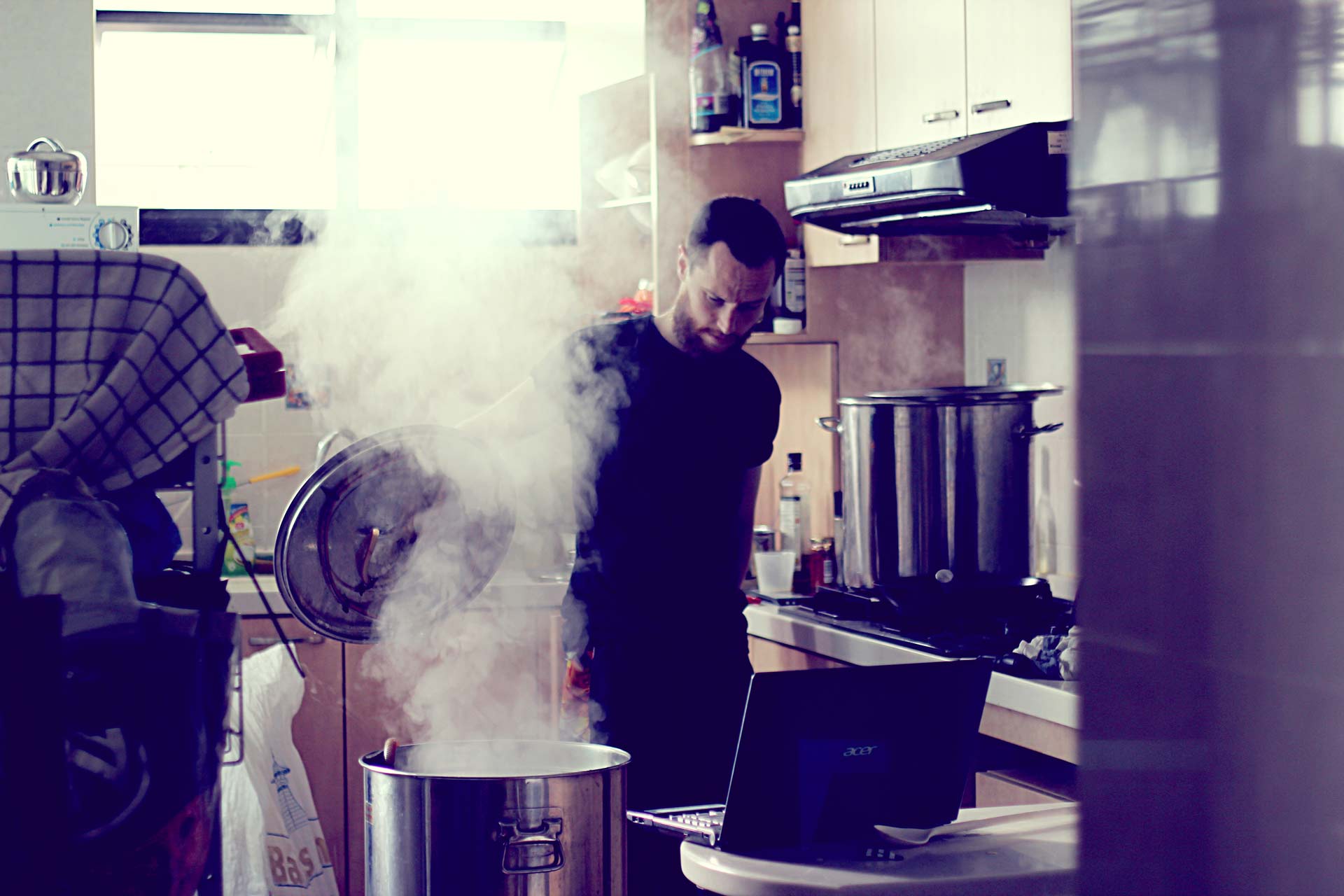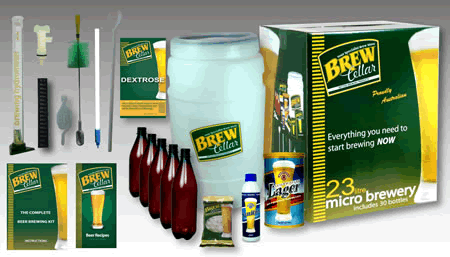We get a deluge of questions every time we tell people we brew beer. And I guess it’s only apt that we try and address them in an as-succinct-as-we-can-try-to-make-it post here. Bear with us, as much as we’ll try to simplify things, you might stumble on a concept or two – in which case, we recommend you drop us a comment below with your questions, and we’ll gladly help you, where possible. Now on to our guide:
Very simply put, brewing – homebrewing or otherwise – can be summed up in one sentence:
Brewing is the process of creating sweet water from grain, which is converted into alcohol with yeast.
But of course, unlike putting glass to mouth to savour a good beer, the process is way more complicated than how we’ve summarised it here. There are many ways to homebrew, and the true geeks – like us, who take it on as a serious hobby – tend to advance from a very basic set up by either throwing lots of money into an advanced brewing system (like Speidels’ Braumeister, or the Brewmagic by Sabco), or in our case, improvise by using found and objects created for other purposes to coax sugars and proteins out of grain to make beer.
We won’t go quite in depth into how beer is made, as it’s been covered to death elsewhere everywhere, but I’m happy to point you to this infographic for a primer on how beer is made.
Done with those? Great! Now we’ll show you how to make your own beer in Singapore.
A word of warning: the road to creating a beer that you’ll enjoy litres and litres of will take effort and time to achieve. This is something that the websites or Youtube videos you see online that claim that you can make beer easily at home won’t tell you. We’ve learned the hard way through making beers that taste like bubblegum, and worse, icky Chinese medicine, that there is a rather steep learning curve and good doses of cleanliness, patience, and a love for good craft beer are a must.
Extract brewing
To start, you’ll probably get yourself a homebrew kit, which still makes a pretty worthy investment should you decide to advance in your journey to making better beer. Probably the easiest kit you’ll find will be the Brewer Cellar Complete Beer Brewing Kit or the Coopers DIY Brew Kit, available at the two homebrew supply stores locally. You can either choose the Coopers kit from iBrew at http://www.ibrew.com.sg/ from Raymond Lee or the Brew Cellar kit that Neo Say Wee at http://www.homebrewco.com.sg/ sells though. Neo, being a brewer at Brewerkz, has been immensely helpful in helping us improve our brews over the years and we like that his website gives you the option to select the kind of beer you want to start brewing, and lets you purchase a small amount of hops to go with your kit – that’s a hack to make your beer taste a little bit more like the craft beers you like (assuming everything goes right!).
Brewing out of a kit like Brew Cellar or Coopers is what we call extract brewing. As part of your kit, you’ll get a can of sticky sauce – that’s the extract – which is the wort (sugared water extracted from barley, wheat and other grains) made into a syrup for the easiest way to brew at home. Heat up the syrup, throw it into the santised fermenter (that’s the large, opaque white container in the picture above), throw in the right amount of hot water and stir. When the syrup’s nice and diluted, put in some ice to try and cool it down to below 30 degrees celsius (yeast dies above that temperature) before chucking in the foiled package of yeast that comes with your extract kit, and put it in a cool place (if you’re making an ale, we’re talking a cool, dry environment of between 18 to 24 degrees, lagers 7 to 12 degrees.) Sounds easy enough? It is, quite, if you’ve got refrigeration space nailed down in your house.
Unfortunately – and you’ll see why after you’ve made your first extract brew – the beer isn’t fantastic at all. On the tongue of a hardened craft beer drinker, the flavour of an extract kit can be picked up almost immediately. Sometimes you’ll get a metallicky flavour, probably because your wort syrup has been sitting in a can, and other times, you’ll get a thin flavour from the beer, or a brew that’s too sweet on the tongue. That said, we’re not dissing it. Extract brewing is how we and almost all other brewers start, and we still recommend you start that way as it’s a good way for you to discover whether or not brewing is really for you or not. After extract brewing, you’ll be spending more money on your equipment, on buying grains and hops, and the habits you’ll pick up making an extract kit will follow you throughout your brewing hobby. Plus, if you really love beer, you’ll want to push yourself to make better and better beer – brewing an extract beer helps you throw down a personal gauntlet. One that will drive you to do better and better. :)
In an extract brew, the first part of the big sentence we outlined above is settled for you. You’ve given the sweet, sweet wort nectar, and don’t quite have to worry about pulling out the sugar from grain just yet. When you’re ready to advance – and you’ll know, as you’ll probably be sick of tasting extract beer, but not sick enough to give up the hobby – there are a lot of different ways to take the step up, using methods like brew in a bag, the Brooklyn Beer kit, or the expensive brew equipment we mentioned above.
As Nick and our house mate, Markus (he helped set up our brew system) are full on, proper science geeks (they study quantum physics – mad, I know), we’ve instead gone down a very hacky, DIY path of creating a brew. To read more about our system, click on to this page, where we take you through the science of our brewing equipment. Only true geeks need apply – it gets really, really technical in there!
We won’t go too much into the intricacies of the more advanced methods. But if you’re keen to pick up the hobby and are already an avid craft beer drinker, Nick and I will be conducting homebrew orientations for newbies – we started mainly because we were getting a lot of interest on the Singapore Homebrew facebook page, but as the group has started to get really full, we have had to restrict membership to homebrewers. To find out when our next homebrew class will take place, fill in the form here.
We hope this clears up the basics of brewing beer in Singapore. As always, please feel free to leave any questions or comments below – we’re happy to answer even the most noob sounding of questions, no judgment exercised! :)


2 Comments
Hey there guys.
Was wondering if you might be able to recommend somewhere in Singapore to get a basic homebrew keging setup?
Cheers
Greg
Hi
can get the beer making training in Singapore?